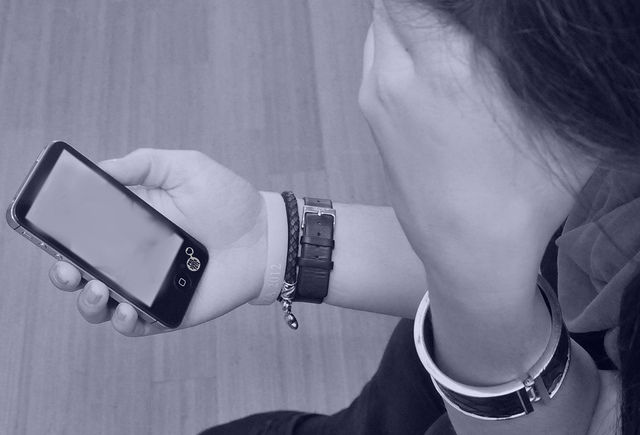The police share this latest news. Ed
Students from a school in Hampshire are spreading a message of support to help young people avoid nude pictures and their life-changing consequences.
The pupils, from Robert May’s School in Odiham, have presented the latest version of an animated film they created to an invited audience during an event this evening (Monday, February 6) organised ahead of World Safer Internet Day tomorrow (Tuesday, February 7).
The occasion follows Robert May’s School being chosen as the winners of Hampshire Constabulary’s Police Apprentice sexting prevention campaign competition in November last year on national children’s takeover day.
The winning idea
The students, aged 13 and 14, from Robert May’s created an animation warning how one young girl’s nude picture can spread like a ‘wildfire’ once sent to someone else.
The film illustrates how this female character sends a naked selfie to a boy before he shares the picture many times with other young people.
Two theatrical face masks appear throughout the film to represent the thoughts and emotions experienced by the female and male characters.
The animation includes a message of support for young people, both male and female, to speak with someone they trust to seek help if they encounter a situation where they are encouraged to send a naked selfie to someone.
Students’ work endorsed by police and partner agencies
Their idea was selected in November last year by a panel of expert judges from organisations including the NSPCC, the National Crime Agency (NCA)’s CEOP command, the Office of the Police and Crime Commissioner’s (OPCC) Youth Commission, a BAFTA award-winning computer game designer Gordon Ross, and Hampshire Constabulary’s Deputy Chief Constable Sara Glen.
Since winning the competition on national children’s takeover day last November, the students at Robert May’s have been working with Hampshire Constabulary to develop their animation into a second film that could be shown as part of advice for World Safer Internet Day tomorrow (Tuesday, February 7).
This updated film was presented to an invited audience of families, teachers and community safety professionals inside the chambers of Hart District Council in Fleet this evening (Monday, February 6).
A version including British Sign Language (BSL) for people with hearing loss was also produced and screened by the students following positive comments from the judges last November about the inclusiveness of their original entry, which featured one of the students with sign language skills.
Young people protecting their peers
The Robert May’s School students who created and produced the animated film are:
- Alfie Payne, 14;
- Chyanne Cox, 14;
- Katherine Bowditch, 13;
- Annabel Main, 14;
- Charlotte Applin, 14;
- Anna Driver, 13.
Educating and safeguarding
Everyone involved in this project is proud of the dedication displayed by the students in producing this film, and their commitment to setting a positive example for other young people.
Hampshire Constabulary’s school and youth engagement co-ordinator PC Maria Carrick said:
“What we recognise and respect through our Police Apprentice initiative is the credibility and expertise that young people hold in developing solutions for issues that affect them. This is about educating and safeguarding so young people feel confident in speaking with the police, and seeking help. Hampshire Constabulary can take an approach in partnership with those young people to encourage safer, informed choices.”
Contact details for Hampshire Constabulary can be found on our Website.
At risk of bullying by peers
Julia Fossi, NSPCC’s Associate Head of Child Online Safety, said:
“It is important that young people can access support and information if they are being pressured to take part in sexting or have lost control of an image.
“When a young person takes and shares a self-generated sexual image, they cannot control who views it, leaving them at risk of bullying by peers or being targeted by adult sex offenders.
“If a young person is worried about an image they have shared, they can talk to a Childline counsellor who will work with the Internet Watch Foundation to try and remove the image from the internet. They can speak to a counsellor by ringing 0800 11 11 or online by visiting www.childline.org.uk
“The NSPCC has created a guide for parents on talking to their children about sexting, and getting images removed from circulation, as well as other issues relating to their online world- www.nspcc.org.uk/sexting
“Parents can also contact the NSPCC Helpline on 0808 800 5000 if they are worried about a child or for support in getting an image of their child removed from the Internet.”
Focused on cyber safety
One of the judges from last November’s Police Apprentice final panel, Sophie Smith from the Hampshire OPCC Youth Commission said:
“The Youth Commission aims to get the voice of young people heard so it’s really important that we have events where people can play an active role within different crime related issues. For us particularly where we’re focusing on cyber safety, it’s really good we can have an involvement.”
Next stages of the campaign
The contents of this animated film will now form part of Hampshire Constabulary’s ongoing work with schools and young people to increase understanding of the law and consequences involving the sharing of nude pictures online and via digital devices.
The force would like to thank all our partner agencies for their support of this initiative so far. These organisations include:
● The National Society for the Prevention of Cruelty to Children (NSPCC);
● The National Crime Agency (NCA) CEOP command;
● The Hampshire Office of the Police and Crime Commissioner (OPCC) Youth Commission: http://www.hampshire-pcc.gov.uk/youth-commission ;
● Hart District Council.
For more information about Hampshire Constabulary’s Police Apprentice initiative, please visit the force’s website: http://www.hampshire.police.uk/internet/news-and-appeals/campaigns/police-apprentice-competition
Improving the understanding of the law and effects of sexting
An anonymous survey of more than 900 students across local secondary schools in 2016 conducted by Hampshire Constabulary produced the following responses:
● 13 per cent (of 862 who answered this question) did not think it was against the law for young people aged under 18 to take, send or share naked selfies or images of a sexual nature.
● 17 per cent (of 862 who answered this question) were not sure.
● More than a third (36 per cent of 852 who answered this question) of students surveyed said they or someone they knew had been involved directly or affected by sexting.
● When asked if they would know what to do if sexual or naked images of you or a friend were shared with others or used against you, 40 per cent (of 851 who answered this question) said no.
Image: pro-juventute under CC BY 2.0





